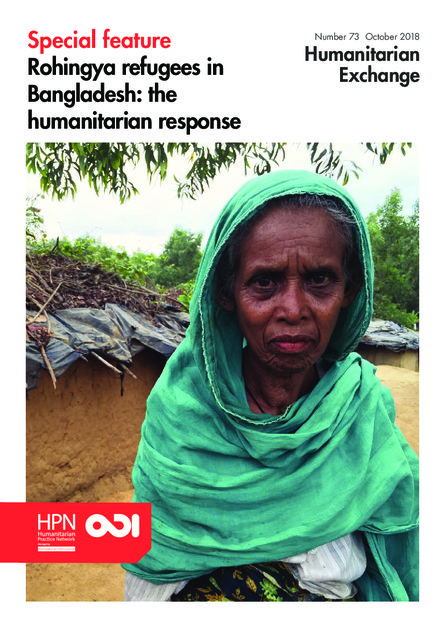
More than 700,000 Rohingya refugees have arrived in Bangladesh since 25 August 2017 fleeing violence and persecution in Rakhine State, Myanmar. Over a million are sheltering in overcrowded camps without adequate assistance or protection. Stateless in Myanmar and denied refugee status in Bangladesh, the Rohingya have few rights or freedoms. Monsoons and cyclones are causing landslides, destroying shelters and infrastructure and disrupting services.
This edition of Humanitarian Exchange focuses on the humanitarian response to the Rohingya crisis. In the lead article, Mark Bowden outlines the historical, local and national political context in Bangladesh, and its operational implications. Amal de Chickera highlights the links between statelessness and displacement, and the international community’s failure to prioritise human rights in its dealings both with Bangladesh and with Myanmar. Puttanee Kangkun and John Quinley document the persistent persecution and denial of rights the Rohingya have faced for decades. Jeff Crisp reflects on the premature, involuntary and unsafe return of Rohingya refugees to Myanmar in the 1970s and 1990s, and asks whether this could happen again.
Sally Shevach and colleagues explore how the ‘localisation’ agenda has influenced the operational response, and Kerrie Holloway draws on research by the Humanitarian Policy Group to test the common assumption that local actors necessarily have a better understanding of people’s needs. Nasif Rashad Khan and colleagues and Ashish Banik reflect on their experiences of engaging with the international humanitarian response system. Margie Buchanan-Smith and Marian Casey-Maslen discuss evaluation findings relating to communication and community engagement, a theme taken up by Nick Van Praag and Kai Hopkins, who report on a Ground Truth survey on refugees’ perceptions of assistance. Julia Brothwell discusses the British Red Cross/Bangladesh Red Crescent involvement in disaster preparedness and risk reduction during the monsoon season, and Gina Bark, Kate White and Amelie Janon outline the consequences of long-term exclusion from basic healthcare services in increasing vulnerability to preventable diseases. Matthew Wencel and colleagues round off the issue with reflections on data collection coordination and other challenges associated with monitoring large concentrations of refugees.